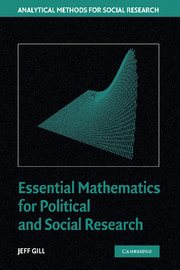Book contents
- Frontmatter
- Contents
- List of Tables
- List of Illustrations
- List of Examples
- Preface
- 1 The Basics
- 2 Analytic Geometry
- 3 Linear Algebra: Vectors, Matrices, and Operations
- 4 Linear Algebra Continued: Matrix Structure
- 5 Elementary Scalar Calculus
- 6 Additional Topics in Scalar and Vector Calculus
- 7 Probability Theory
- 8 Random Variables
- 9 Markov Chains
- References
- Author Index
- Subject Index
7 - Probability Theory
Published online by Cambridge University Press: 05 June 2012
- Frontmatter
- Contents
- List of Tables
- List of Illustrations
- List of Examples
- Preface
- 1 The Basics
- 2 Analytic Geometry
- 3 Linear Algebra: Vectors, Matrices, and Operations
- 4 Linear Algebra Continued: Matrix Structure
- 5 Elementary Scalar Calculus
- 6 Additional Topics in Scalar and Vector Calculus
- 7 Probability Theory
- 8 Random Variables
- 9 Markov Chains
- References
- Author Index
- Subject Index
Summary
Objectives
We study probability for a variety of reasons. First, probability provides a way of systematically and rigorously treating uncertainty. This is an important idea that actually developed rather late in human history. Despite major contributions from ancient and medieval scholars, the core of what we use today was developed in the seventeenth and eighteenth centuries in continental Europe due to an intense interest in gambling by various nobles and the mathematicians they employed. Key scholars of this period included Pascal, Fermat, Jacob Bernoulli, Johann Bernoulli, de Moivre, and later on Euler, Gauss, Lagrange, Poisson, Laplace, and Legendre. See Stigler (1986, 1999) or Dale (1991) for fascinating accounts of this period. In addition, much of the axiomatic rigor and notation we use today is due to Keynes (1921) and Kolmogorov (1933).
Interestingly, humans often think in probabilistic terms (even when not gambling), whether we are conscious of it or not. That is, we decide to cross the street when the probability of being run over by a car is sufficiently low, we go fishing at the lakes where the probability of catching something is sufficiently high, and so on. So, even when people are wholly unfamiliar with the mathematical formalization of probability, there is an inclination to frame uncertain future events in such terms.
Third, probability theory is a precursor to understanding statistics and various fields of applied mathematics. In fact, probability theory could be described as “mathematical models of uncertain reality” because it supports the use of uncertainty in these fields. So to study quantitative political methodology, game theory, mathematical sociology, and other related social science subfields, it is important to understand probability theory in rigorous notation.
- Type
- Chapter
- Information
- Essential Mathematics for Political and Social Research , pp. 284 - 329Publisher: Cambridge University PressPrint publication year: 2006

